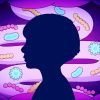
AsianScientist (Sept. 22, 2024) – Identifying autism in young children can be tricky. Autism spectrum disorder (ASD) is a neurodevelopmental condition with a wide range and varying severity of symptoms that impact how individuals communicate and engage with the world. With no definitive medical tests, accurate diagnosis typically depends on parents’ responses to questionnaires and the assessments by healthcare providers.
In a new study published in Nature Microbiology, researchers from the Chinese University of Hong Kong (CUHK) spotted distinct differences in the diversity and metabolic function of gut microbes between autistic children and neurotypical peers. Their findings could bring us closer to more objective diagnostic methods for ASD, enabling earlier and potentially more effective interventions.
Scientists have long been exploring the complex interplay between genetics and the environment in ASD development to identify reliable indicators. The gut microbiome—a diverse community of bacteria, fungi, viruses and archaea residing in the intestines—plays an important role in the body and is strongly connected to overall health. Growing evidence have pointed to a link between ASD and disruptions in the communication between the gut microbiome and the central nervous system, also known as the gut-brain axis.
Until now, most studies looking into the diagnostic potential of gut microbes in stool have primarily focused on changes in intestinal bacteria. Their small sample sizes have frequently led to varied outcomes.
To find clearer answers, the study authors analyzed sequencing data from the fecal samples of 1,627 children, aged 1 to 13 years old, both with and without ASD. By applying machine learning and considering clinical factors including diet, medication and co-morbidities, they discovered a significant drop in microbial diversity in kids with ASD. This decline impacted the relative abundance of 80 out of 90 species, mostly bacteria. The study also detected changes in 27 microbial genes and 12 metabolic pathways in the children on the autism spectrum.
From their analysis, the scientists established 31 unique biological signatures associated with autism. Testing them on an independent group of children predicted ASD with near-perfect accuracy.
The lead author, Su Qi, a research assistant professor in the department of medicine and therapeutics at CUHK said “We found that the 31-microbiome panel has a sensitivity of 94% and specificity of 93% for the diagnosis of ASD, and maintained a sensitivity of 91% in children from an independent hospital cohort and a younger community cohort from one to six years old.”
While more research would be helpful in solving exactly how the gut microbiome fits into the puzzle of ASD development, this landmark study could one day lead to a future platform that integrates genetic, microbial, and simple behavioral assessments to improve detection.
“Diagnosis is often delayed especially in younger children who may only have mild symptoms and this could lead to delayed intervention,” said Siew Ng, author of the study and Croucher Professor in Medical Sciences at CUHK.
“This, to our knowledge, is the first study to demonstrate the robustness and utility of a non-invasive biomarker to diagnose and predict ASD across different ages, gender and settings,” he added.
—
Source: The Chinese University of Hong Kong ; Image: Shelly Liew/ Asian Scientist Magazine
The article can be found at Multikingdom and functional gut microbiota markers for autism spectrum disorder.
Disclaimer: This article does not necessarily reflect the views of AsianScientist or its staff.

